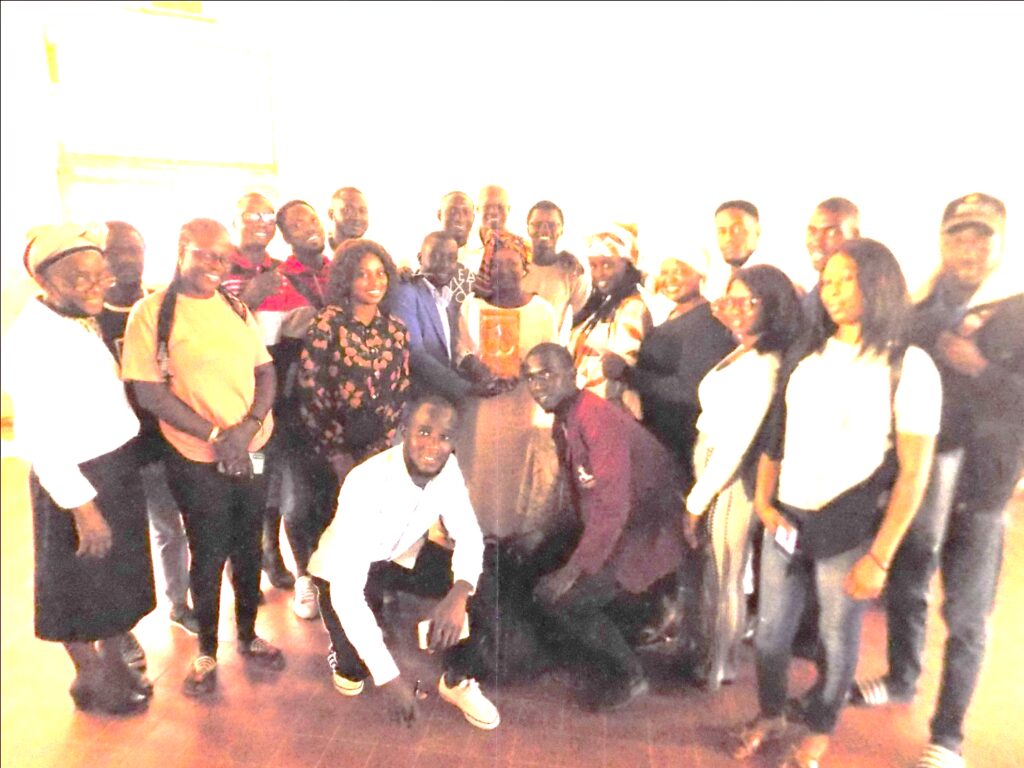By Yunus S Saliu
With the blessing of the professional lecturer, and director of the Theatre-in-Education Literature Program, University of The Gambia, Madam Grace Chapman of the School of Arts and Sciences and its students, on Thursday, 15th December, on invitation hosted the Gambian prolific playwright and director Madam Janet Badjan-Young as a guest lecturer for the Drama and Society class, at the auditorium of the UTG, Brikama Campus.
The guest lecturer lecture was based on her play, Chains of Inspiration, the book was read and analysed by students enrolled in the Drama and Society class this semester, and the lecture was followed by a discussion of issues and characters impacted by the Trans-Atlantic Slave Trade as explicated in the text.
In her lecture, the playwright, Janet Badjan-Young quoted from Google that “history is the knowledge of and study of the past. It is the story of the past and a form of collective memory, history is the story of who we are, where we come from, and can potentially reveal where we are headed.”
She said, according to Lee Jamieson in ‘what makes a Shakespeare History Play,’ Shakespeare was not attempting to render an accurate picture of the past. Rather, he was writing for the entertainment of his theater audience and therefore molded historical events to suit their interest.
The two historical plays that she wrote, she said, are based on accurate stories from the perspective of West African historians and communities, “these plays reflect our stories.”
She went on that she had some experience in writing a historical drama based on the war in a town in the Lower River Division (Region) and this is called The Battle of Sankandi which was staged in 2002.
The prolific playwright explained the reason for choosing to write a historical drama to present at the historic opening of the Ebunjan Theatre, the first theatre in the Gambia, and also why not consider using traditional dancers; kankurang masked devils to display their creative skills but instead chose the slave trade.
“Slavery is an important element of our history. A time when white men left their homes in Europe got on a ship, set sail arrived in our part of the world, and saw the bounteous gifts we had in abundance, gold, precious stones, our trees of fruits, all kinds of fish, our rivers and lakes, they decided to take whatever they fancied making their lives and their children’s lives, secure and prosperous,” she stated.
In her reason for the historical drama, she said “I examined it and concluded that the information on whites in Africa and taking Africa’s wealth was not remarkable for a historical drama.”
Meanwhile, Badjan-Young extolled Madam Grace Chapman for her excellent professionalism and dedication to students and her skills in Theatre Arts, she described her as an amazing director and actor, “we are blessed to have her.”
Commenting on the historical events in dramatic literature, Madam Grace Chapman said The Drama and Society curse is designed to impact students with a broad understanding of theatre drama and its essential, historical function(s) in society.
She stated that dramatic criticism is the tool used to deepen understanding of strategies employed by playwrights, theatre-in-education specialists, drama therapists, and political activists to communicate, raise awareness, and/or change perceptions of the human condition.
Nevertheless, Madam Grace Chapman and students used the occasion to rejoice with Madam Janet Badjan-Young popularly called Aunt Janet who clocked 85 years on Friday, 15th December 2022.

